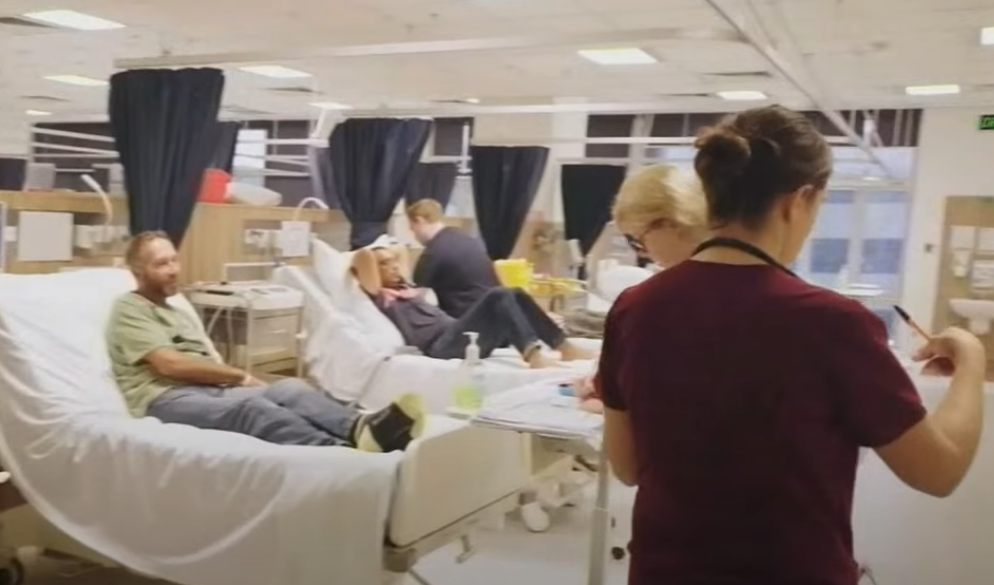
You're checking your emails when an intriguing opportunity pops up—participate in a medical study and earn several thousand dollars for your time. It sounds almost too good to be true, but clinical trials are offering exactly this to everyday Australians, including many over 60.
With nearly 14,000 clinical trials registered in Australia in the past year and the government investing $750 million over 10 years to boost research activity, these opportunities are becoming increasingly common and accessible. But as with any significant decision, there's a lot to consider before you sign up.
The real money involved
'Participants are paid over $500 per night for volunteering in clinical trials'
Payment amounts vary dramatically depending on the trial type and commitment required. Recent participant experiences show payments ranging from $750 for shorter trials through to $8,000, with rates typically around $10 per hour or up to $360 per day.
Some research facilities like Linear Clinical Research pay over $500 per night for overnight stays, with accommodation, Wi-Fi, and all meals included.
These payments are designed to cover travel, parking and other expenses rather than compensate for lost income or childcare costs. Australian guidelines specify that reimbursements should be proportionate to time involved and may not include incentives that encourage participants to take inappropriate risks.
Why your participation matters more than you might think
Here's something that might surprise you: despite people aged 65 and over representing only 13 per cent of the population, they consume nearly one-third of all medications. Yet older people have been clearly under-represented in clinical trials, with trial participants often being fitter than typical patients seen in geriatric clinics.
Many older adults have special health needs, react differently to certain drugs or need different doses, and are more likely to have age-related diseases like Alzheimer's, cataracts, and arthritis. This creates a concerning gap between who tests the medications and who ultimately uses them.
The trials happening right now
Australian research facilities are currently running trials for conditions that significantly impact older adults. Nucleus Network, for example, is testing treatments for heart attacks, recognising that current treatments focus on restoring blood flow but don't fully protect the heart from damage.
They're also investigating new treatments for type 2 diabetes and obesity, conditions increasingly common with age.
Previous trials have covered mental health disorders, heart disease, Parkinson's, Alzheimer's and cancer—many of the health challenges that become more prevalent as we age.
What you need to know about safety
Red flags: spotting clinical trial scams
Requests for upfront payments or fees
Promises of guaranteed results or cures
Pressure to sign up immediately
No medical supervision mentioned
Unrealistic payment amounts
No informed consent process
Contact details that aren't verifiable
While clinical trials are heavily regulated, there are specific safety considerations for older participants.
Geriatric patients are more prone to adverse effects due to existing health conditions and other medications, with effects potentially being more severe or less tolerated than in younger people.
Increased susceptibility to blood pressure or sedative effects of drugs may lead to falls, fractures, and loss of independence. Similar serious consequences can occur with drug-induced cognitive deterioration, delirium and incontinence.
However, legitimate trials prioritise safety above all else, with each trial adhering to rigorous protocols and dedicated medical teams closely monitoring participants throughout their journey.
Understanding the commitment
Clinical trials vary significantly in their requirements. Some involve short clinic visits, while others might require overnight stays ranging from single nights to three weeks. Outpatient visits can range from none to 20 or more.
While some trials require minimal time and effort, others involve major commitments including discomfort, extra treatments, tests, hospital visits or complicated medication requirements such as keeping symptom diaries or collecting 24-hour urine specimens.
Your rights and protections
No one can enter you into a clinical trial without your consent, and you're free to say yes or no at any time without pressure. Everyone must give 'informed consent' - a voluntary decision made after considering information about the trial and alternative options.
You can withdraw from a study at any time without any effect on your ongoing medical care, and your involvement is entirely voluntary.
Safety first: essential questions before signing up
- Who is supervising the medical aspects of this trial?
- What are the specific risks for someone my age?
- How will my existing medications interact with the trial treatment?
- What happens if I experience complications?
- Can I speak to other participants who've completed similar trials?
- Is this trial registered with Australian authorities?
Finding legitimate opportunities
Many legitimate providers list current trials on their websites, and a new online trial finder by Nucleus Network is launching in Sydney next year to streamline the matching process based on age, location and availability.
The government is also setting up a National One Stop Shop website to make it easier for patients and researchers to participate in clinical trials.
Legitimate research facilities typically start with a free health check, where you'll meet with a medical officer to review your medical history, complete a physical exam, and go through the informed consent process.
Making the decision
Before considering any clinical trial, speak to your doctor first. Think carefully about the demands on your time and the possible risks and benefits. Consider taking a family member or friend along for support and help with asking questions or recording answers.
Clinical trials offer a genuine opportunity to contribute to medical advancement while potentially earning substantial compensation. For many older Australians, they also provide access to cutting-edge treatments and extensive medical monitoring. However, the key is approaching these opportunities with both open-mindedness and appropriate caution.
The opportunity to participate in clinical trials while earning meaningful compensation is real and growing in Australia. The question isn't whether these opportunities exist—it's whether you're prepared to make an informed decision about participating.
Have you ever considered participating in a clinical trial, or do you have questions about how to evaluate these opportunities safely? We'd love to hear about your experiences or concerns in the comments below.
Original Article
https://www.9news.com.au/national/h...research/506f2484-849d-40d2-9126-86fd5486b614
Australian Clinical Trials
Cited text: An Australian Government initiative to provide information and resources to participants, healthcare providers, researchers and industry about taking ...
Excerpt: With nearly 14,000 clinical trials registered in Australia in the past year and the government investing $750 million over 10 years to boost research activity, these opportunities are becoming increasingly common and accessible
https://www.australianclinicaltrials.gov.au/
Clinical Trials Activity initiative | Australian Government Department of Health, Disability and Ageing
Cited text: The Clinical Trials Activity initiative will provide $750 million over 10 years from 2024—25. It will help Australian researchers and patients test ne...
Excerpt: With nearly 14,000 clinical trials registered in Australia in the past year and the government investing $750 million over 10 years to boost research activity, these opportunities are becoming increasingly common and accessible
https://www.health.gov.au/our-work/mrff-clinical-trials-activity-initiative
How to get Paid for Clinical Trials/Medical Testing in Australia—The Thrifty Issue
Cited text: The payments I heard ranged from $750 (quite a short trial) through to $8,000.
Excerpt: Payment amounts vary dramatically depending on the trial type and commitment required.
https://www.thethriftyissue.com.au/get-paid-clinical-trials-medical-testing-australia/
How to get Paid for Clinical Trials/Medical Testing in Australia—The Thrifty Issue
Cited text: The payments I heard ranged from $750 (quite a short trial) through to $8,000. The payments are essentially $10 per hour but up to $360 a day, so less...
Excerpt: Payment amounts vary dramatically depending on the trial type and commitment required.
https://www.thethriftyissue.com.au/get-paid-clinical-trials-medical-testing-australia/
Pioneer in Early-phase Clinical Trial Services in Australia
Cited text: Participants are paid over $500 per night for volunteering in clinical trials at Linear Clinical Research.
Excerpt: Some research facilities like Linear Clinical Research pay over $500 per night for overnight stays, with accommodation, Wi-Fi, and all meals included
How to get Paid for Clinical Trials/Medical Testing in Australia—The Thrifty Issue
Cited text: Payments are made in instalments and are designed to cover travel, parking and other expenses incurred while doing the trial. They are not designed to...
Excerpt: These payments are designed to cover travel, parking and other expenses rather than compensate for lost income or childcare costs
https://www.thethriftyissue.com.au/get-paid-clinical-trials-medical-testing-australia/
Clinical Research Regulation For Australia | ClinRegs
Cited text: The G-NatlStmt states that it is generally appropriate to reimburse participants for the costs associated with taking part in research including trave...
Excerpt: Australian guidelines specify that reimbursements should be proportionate to time involved and may not include incentives that encourage participants to take inappropriate risks
https://clinregs.niaid.nih.gov/country/australia
Elderly patients’ participation in clinical trials—PMC
Cited text: The elderly are the majority users of many medicines. Although persons aged ≥65 years represent only about 13 per cent of the population, they consume nearly ...
Excerpt: despite people aged 65 and over representing only 13 per cent of the population, they consume nearly one-third of all medications
https://www.ncbi.nlm.nih.gov/pmc/articles/PMC4640010/
Clinical trials in older people | Age and Ageing | Oxford Academic
Cited text: Despite the fact that older people use the largest share of all medications, they have been clearly underrepresented in clinical trials [4].
Excerpt: older people have been clearly under-represented in clinical trials, with trial participants often being fitter than typical patients seen in geriatric clinics
https://academic.oup.com/ageing/article/51/5/afab282/6581615
Clinical trials in older people | Age and Ageing | Oxford Academic
Cited text: Although the inclusion of them in drug trials has lately been increasing [8], trial participants often differ from the patients seen in geriatric clin...
Excerpt: older people have been clearly under-represented in clinical trials, with trial participants often being fitter than typical patients seen in geriatric clinics
https://academic.oup.com/ageing/article/51/5/afab282/6581615
65 or older? Clinical trials need you | NIH MedlinePlus Magazine
Cited text: Many older adults have special health needs. The also react differently to certain drugs or need different doses. They’re also more likely to have age...
Excerpt: Many older adults have special health needs, react differently to certain drugs or need different doses, and are more likely to have age-related diseases like Alzheimer's, cataracts, and arthritis
https://magazine.medlineplus.gov/nih-resources/65-or-older-clinical-trials-need-you
Melbourne clinical trials | Nucleus Network
Cited text: At Nucleus Network, we take the time to understand you and your health history, so we can match you with clinical trials that truly fit · The study dr...
Excerpt: Nucleus Network, for example, is testing treatments for heart attacks, recognising that current treatments focus on restoring blood flow but don't fully protect the heart from damage
https://www.nucleusnetwork.com/participants/find-a-trial/melbourne-clinical-trials/
Melbourne clinical trials | Nucleus Network
Cited text: The study drug is being developed to help treat heart attacks. A heart attack happens when blood flow to part of the heart is blocked, which can damag...
Excerpt: Nucleus Network, for example, is testing treatments for heart attacks, recognising that current treatments focus on restoring blood flow but don't fully protect the heart from damage
https://www.nucleusnetwork.com/participants/find-a-trial/melbourne-clinical-trials/
Melbourne clinical trials | Nucleus Network
Cited text: This study is testing a new drug designed to help control blood sugar and reduce weight in individuals with type 2 diabetes or obesity.
Excerpt: They're also investigating new treatments for type 2 diabetes and obesity, conditions increasingly common with age
https://www.nucleusnetwork.com/participants/find-a-trial/melbourne-clinical-trials/
Elderly patients’ participation in clinical trials—PMC
Cited text: Geriatric patients are more prone to adverse effects due to comorbidities and concomitant drugs. The adverse effects can be severe, or less tolerated,...
Excerpt: Geriatric patients are more prone to adverse effects due to existing health conditions and other medications, with effects potentially being more severe or less tolerated than in younger people
https://www.ncbi.nlm.nih.gov/pmc/articles/PMC4640010/
Underrepresentation of the elderly in clinical trials, time for action—PMC
Cited text: An increased susceptibility to hypotensive or sedative effects of drugs may lead to falls, fractures, and a loss of independence, forcing the patient ...
Excerpt: Increased susceptibility to blood pressure or sedative effects of drugs may lead to falls, fractures, and loss of independence
https://pmc.ncbi.nlm.nih.gov/articles/PMC7495271/
Underrepresentation of the elderly in clinical trials, time for action—PMC
Cited text: The same serious consequences can be found in cases of drug induced cognitive deterioration/delirium and incontinence.
Excerpt: Similar serious consequences can occur with drug-induced cognitive deterioration, delirium and incontinence
https://pmc.ncbi.nlm.nih.gov/articles/PMC7495271/
Pioneer in Early-phase Clinical Trial Services in Australia
Cited text: Your safety is our top priority. Each trial adheres to rigorous protocols, with dedicated medical teams closely monitoring participants throughout the...
Excerpt: However, legitimate trials prioritise safety above all else, with each trial adhering to rigorous protocols and dedicated medical teams closely monitoring participants throughout their journey
How to get Paid for Clinical Trials/Medical Testing in Australia—The Thrifty Issue
Cited text: Some clinical trials require you to stay in the clinic/hospital for quite a while, others are short. Outpatient visits can vary from none to 20 or mor...
Excerpt: Clinical trials vary significantly in their requirements. Some involve short clinic visits, while others might require overnight stays ranging from single nights to three weeks.
https://www.thethriftyissue.com.au/get-paid-clinical-trials-medical-testing-australia/
What you should know about taking part in a clinical trial | Australian Clinical Trials
Cited text: While some clinical trials require minimal time and effort from participants, others require a major commitment and involve discomfort or pain. Some p...
Excerpt: While some trials require minimal time and effort, others involve major commitments including discomfort, extra treatments, tests, hospital visits or complicated medication requirements such as keeping symptom diaries or collecting 24-hour…
https://www.australianclinicaltrials.gov.au/participants/what-you-should-know
What you should know about taking part in a clinical trial | Australian Clinical Trials
Cited text: ... No one can enter you into a clinical trial if you don't want to take part. If you are asked to take part, you are free to say yes or no at any tim...
Excerpt: No one can enter you into a clinical trial without your consent, and you're free to say yes or no at any time without pressure
https://www.australianclinicaltrials.gov.au/participants/what-you-should-know
What you should know about taking part in a clinical trial | Australian Clinical Trials
Cited text: Everyone taking part in a clinical trial must give ‘informed consent’.
Excerpt: Everyone must give 'informed consent' - a voluntary decision made after considering information about the trial and alternative options
https://www.australianclinicaltrials.gov.au/participants/what-you-should-know
What you should know about taking part in a clinical trial | Australian Clinical Trials
Cited text: Informed consent is a decision, given voluntarily, to agree to a healthcare treatment, procedure or other intervention.
Excerpt: Everyone must give 'informed consent' - a voluntary decision made after considering information about the trial and alternative options
https://www.australianclinicaltrials.gov.au/participants/what-you-should-know
Clinical Trials—Medicines Australia
Cited text: Potential participants will be made aware that they can withdraw from a study at any time, without any effect on ongoing medical care and that their i...
Excerpt: You can withdraw from a study at any time without any effect on your ongoing medical care, and your involvement is entirely voluntary
https://www.medicinesaustralia.com.au/policy/clinical-trials/
Clinical Trials Activity initiative | Australian Government Department of Health, Disability and Ageing
Cited text: The Clinical Trials Activity initiative will provide $750 million over 10 years from 2024—25.
Excerpt: The government is also setting up a National One Stop Shop website to make it easier for patients and researchers to participate in clinical trials
https://www.health.gov.au/our-work/mrff-clinical-trials-activity-initiative
Clinical Trials Activity initiative | Australian Government Department of Health, Disability and Ageing
Cited text: The objective of this initiative is to increase clinical trial activity in Australia to: improve the evidence base supporting clinical care · help pat...
Excerpt: The government is also setting up a National One Stop Shop website to make it easier for patients and researchers to participate in clinical trials
https://www.health.gov.au/our-work/mrff-clinical-trials-activity-initiative
Melbourne clinical trials | Nucleus Network
Cited text: Visit the clinic for a free health check. You’ll meet with a medical officer to review your medical history, complete a physical exam, and go through ...
Excerpt: Legitimate research facilities typically start with a free health check, where you'll meet with a medical officer to review your medical history, complete a physical exam, and go through the informed consent process
https://www.nucleusnetwork.com/participants/find-a-trial/melbourne-clinical-trials/
What you should know about taking part in a clinical trial | Australian Clinical Trials
Cited text: However, before participating in a clinical trial, think carefully about the demands on your time, and the possible risks and benefits.
Excerpt: Think carefully about the demands on your time and the possible risks and benefits
https://www.australianclinicaltrials.gov.au/participants/what-you-should-know
What you should know about taking part in a clinical trial | Australian Clinical Trials
Cited text: ... consider taking a family member or friend along for support and for help in asking questions or recording answers · plan what to ask ahead of time...
Excerpt: Consider taking a family member or friend along for support and help with asking questions or recording answers
https://www.australianclinicaltrials.gov.au/participants/what-you-should-know







